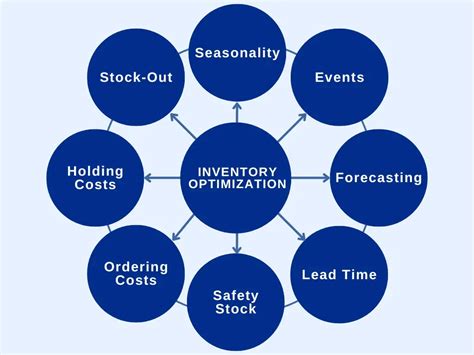Intro
Discover the meaning of SKU and boost inventory management with 5 essential tips, covering product identification, cataloging, and stock control using unique identifiers and barcode scanning for efficient retail operations and supply chain optimization.
In today's fast-paced business world, effective inventory management is crucial for the success of any retail or e-commerce company. One of the key components of a well-organized inventory system is the use of Stock-Keeping Units, commonly referred to as SKUs. Understanding what SKUs are and how they work can make a significant difference in managing your stock efficiently. In this article, we will delve into the world of SKUs, exploring their definition, importance, and how they can be utilized to streamline your inventory management processes.
SKUs are unique codes assigned to each product or service offered by a company. These codes are used to identify, track, and manage inventory levels, making it easier to monitor sales, replenish stock, and prevent overstocking or understocking. With SKUs, businesses can ensure that they have the right products in the right quantities at the right time, thereby enhancing customer satisfaction and reducing operational costs.
The importance of SKUs cannot be overstated. They play a vital role in maintaining accurate inventory records, facilitating quick and efficient order fulfillment, and enabling businesses to make informed decisions about their product offerings. By using SKUs, companies can analyze sales trends, identify best-selling products, and adjust their inventory levels accordingly. This, in turn, helps to minimize waste, reduce storage costs, and improve overall profitability.
Understanding SKUs

To fully appreciate the benefits of SKUs, it is essential to understand how they work. A typical SKU code consists of a combination of letters and numbers that are unique to each product. This code can include information such as the product name, description, size, color, and other relevant details. By scanning or entering the SKU code, businesses can quickly access detailed information about the product, including its inventory level, pricing, and sales history.
Benefits of Using SKUs
The use of SKUs offers numerous benefits to businesses, including improved inventory management, enhanced customer satisfaction, and increased operational efficiency. Some of the key advantages of using SKUs include: * Improved accuracy: SKUs help to eliminate errors in inventory tracking and order fulfillment, ensuring that customers receive the correct products on time. * Increased efficiency: With SKUs, businesses can quickly and easily locate products in their inventory, reducing the time and effort required to fulfill orders. * Better decision-making: By analyzing sales data and inventory levels, businesses can make informed decisions about their product offerings, pricing, and marketing strategies. * Enhanced customer satisfaction: SKUs help to ensure that customers receive the products they want, when they want them, leading to increased customer satisfaction and loyalty.Creating Effective SKUs

Creating effective SKUs requires careful planning and attention to detail. Here are some tips to help you create SKUs that meet your business needs:
- Keep it simple: Avoid using complex or confusing codes that can lead to errors or misunderstandings.
- Make it unique: Ensure that each SKU code is unique to prevent confusion or overlap between products.
- Include relevant information: Incorporate relevant details such as product name, description, size, and color to facilitate quick and easy identification.
- Use a consistent format: Establish a consistent format for your SKUs to make them easier to read and understand.
- Review and update regularly: Regularly review and update your SKUs to ensure they remain accurate and effective.
Best Practices for Using SKUs
To get the most out of your SKUs, it is essential to follow best practices for their use. Some of the key best practices include: * Use SKUs consistently across all sales channels and inventory systems. * Ensure that all staff members understand how to use and interpret SKUs. * Regularly review and update SKUs to reflect changes in product offerings or inventory levels. * Use SKUs to analyze sales trends and make informed decisions about product offerings and pricing.Common Mistakes to Avoid

While SKUs can be a powerful tool for inventory management, there are common mistakes that businesses should avoid. Some of the key mistakes to watch out for include:
- Using duplicate or similar codes for different products.
- Failing to update SKUs regularly to reflect changes in product offerings or inventory levels.
- Not using SKUs consistently across all sales channels and inventory systems.
- Not providing adequate training to staff members on the use and interpretation of SKUs.
Real-World Examples of SKUs in Action
SKUs are used by businesses of all sizes and types, from small retail stores to large e-commerce companies. Here are some real-world examples of SKUs in action: * A fashion retailer uses SKUs to track inventory levels of different clothing items, including sizes, colors, and styles. * An online marketplace uses SKUs to identify and manage the products offered by different sellers. * A manufacturer uses SKUs to track inventory levels of raw materials and finished goods.Future of SKUs

As technology continues to evolve, the use of SKUs is likely to become even more sophisticated. Some of the trends that are likely to shape the future of SKUs include:
- Increased use of automation and artificial intelligence to manage inventory and fulfill orders.
- Greater use of data analytics to inform decision-making and optimize inventory levels.
- Increased adoption of cloud-based inventory management systems to facilitate real-time tracking and updates.
Conclusion and Next Steps
In conclusion, SKUs are a powerful tool for inventory management that can help businesses to streamline their operations, improve customer satisfaction, and increase profitability. By understanding how SKUs work and following best practices for their use, businesses can get the most out of their inventory management systems. Whether you are a small retail store or a large e-commerce company, SKUs can help you to achieve your goals and stay ahead of the competition.SKU Image Gallery









What is a Stock-Keeping Unit (SKU)?
+A Stock-Keeping Unit (SKU) is a unique code assigned to each product or service offered by a company. It is used to identify, track, and manage inventory levels, making it easier to monitor sales, replenish stock, and prevent overstocking or understocking.
Why are SKUs important for inventory management?
+SKUs are important for inventory management because they help to ensure accurate tracking and management of inventory levels. They also facilitate quick and efficient order fulfillment, enable businesses to make informed decisions about product offerings and pricing, and improve overall operational efficiency.
How do I create effective SKUs for my business?
+To create effective SKUs for your business, keep it simple, make it unique, include relevant information, use a consistent format, and review and update regularly. It is also essential to provide adequate training to staff members on the use and interpretation of SKUs.
We hope this article has provided you with a comprehensive understanding of SKUs and their importance in inventory management. Whether you are a small business owner or a large e-commerce company, SKUs can help you to streamline your operations, improve customer satisfaction, and increase profitability. If you have any questions or comments, please feel free to share them below. We would love to hear from you and help you to get the most out of your inventory management system.
